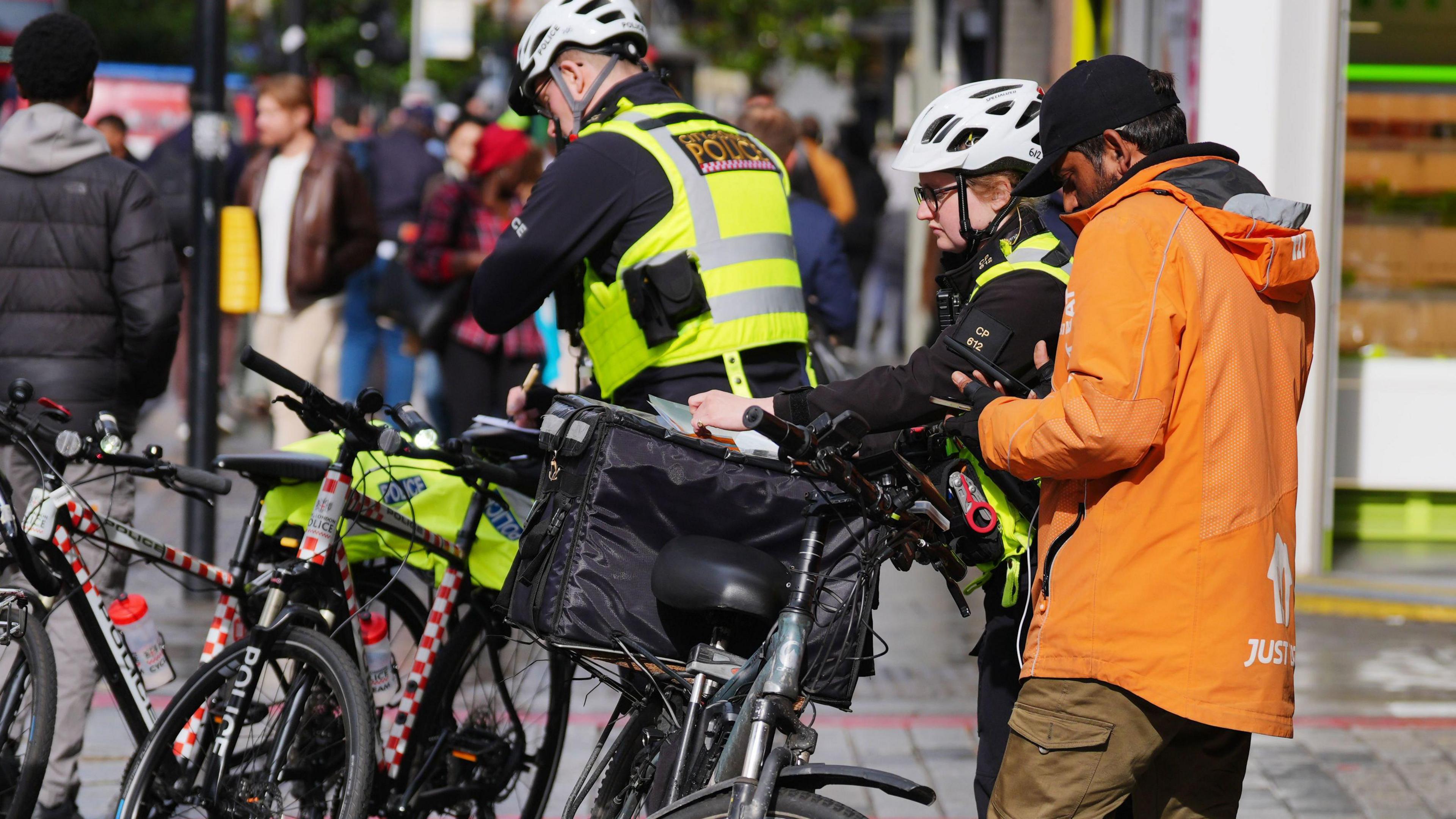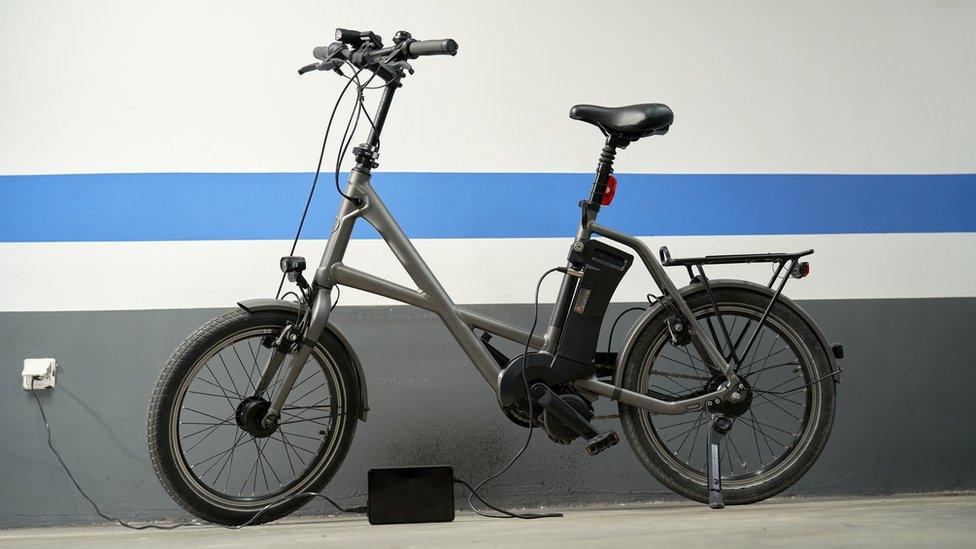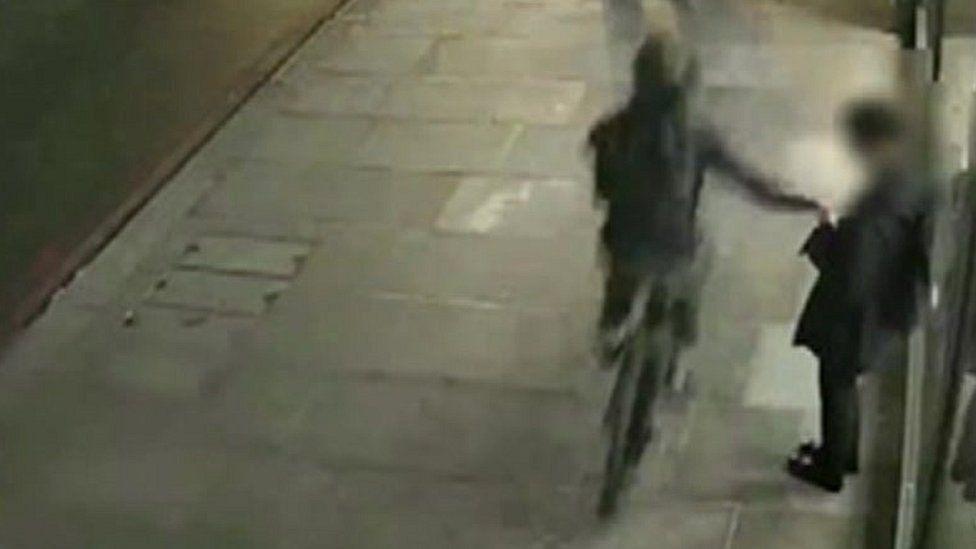Delivery riders getting illegal e-bikes seized

- Published
Most of the riders who had illegally modified e-bikes seized in the City of London in the past year were food deliverers trying to get a faster vehicle to do their job, the head of a specialist unit seizing the bikes has said.
New figures released by 27 police forces to the PA news agency show a steep increase in the number of seizures of e-bikes which have been illegally modified to go faster than 15.5mph - the speed at which they are required to cut out under UK law.
Speaking to the BBC, City of London Police's Sgt Stuart Ford, who leads the cycle response unit, explained the vehicles did not need to be insured and the "vast majority" of the ones his force seized were used by deliverers.
In response to the BBC, food delivery service Deliveroo said it would not work with any riders caught using illegally modified e-bikes.
The broad term 'e-bike' is commonly used for any electric-powered bike, but it can actually refer to very different types of equipment which are covered by different laws.
Bikes which have a small electrical motor which helps cyclists to move the pedals have the 15.5mph (25 kph) speed limit, and their motors cannot exceed 250 watts of power.
These are electrically assisted pedal cycles (EAPC), and under the law these are treated the same as a bicycle and therefore riders do not have to seek insurance.
Illegal e-bikes are more powerful and reach higher speeds, and are not necessarily illegal in themselves - but under the law they are classified as motorcycles, and should not be driven without a licence on the roads.
Modification kits, some of which are sold for as little as £300, can also be used on regular bicycles and allow them to potentially reach speeds as fast as 60mph.
Across the UK, figures show 937 illegal e-bikes were seized in the year to 11 August - up from 511 in the previous 12 months, an 83% increase.
The PA news agency received responses to freedom of information requests from 27 out of 46 police forces it contacted.
Among the forces with the largest year-on-year increases in e-bike seizures were Wiltshire Police (from 24 to 64), Police Scotland (from 60 to 233), Derbyshire Police (from four to 23), Northumbria Police (from 18 to 58) and South Wales Police (from 66 to 137).
City of London Police recorded 295 seizures, which was more than any other police force that provided figures - although it did not have a comparable number for the year before.
Speaking to BBC Radio 4's Today programme, Sgt Ford was asked if most of the e-bikes being seized were used by delivery riders.
He said this was true in "the vast majority of cases".
"Especially... ones which are are being adapted," he said.
"So they’ll buy a normal bike, and then they’ll buy a kit online of batteries - which are unstable in a lot of cases - throttles and rear hub motors that will turn them into mopeds basically."
The police force, which is responsible for policing the square mile in central London, set up its Cycle Response Unit in July last year in response to community concerns about road safety and anti-social behaviour, external.
Earlier this year, City of London Ch Supt Rob Atkin, external said: "Some people have told us that they have nearly been hit and have seen riders mount pavements and run through red lights."
A spokesperson for Deliveroo said it takes its "responsibilities seriously to ensure the safety of riders and the communities where we operate".
"Riders are required to use legal and roadworthy vehicles at all times, and as with all road users, they must follow local traffic laws and regulations."
Potential law changes
Efforts have been made to tighten up the rules for cyclists generally, and specifically for anyone using illegal e-bikes.
Prior to the conclusion of the last parliament, legislation spearheaded by Tory MP Iain Duncan Smith would have made dangerous cycling a specific offence.
The law change, which would have come in as part of an amendment to the Criminal Justice Bill, was not passed in time for the end of the last Parliament.
Speaking on BBC Radio 4's Today programme, Duncan Smith said he would continue to campaign for a change in the law.
"It’s getting [cyclists] within the highway code, so that dangerous cycling, or cycling that causes death or injury, are prosecutable offences. And for cyclists to understand they’re not above the law," he said.
Related topics
- Published9 June 2023

- Published30 January 2024
